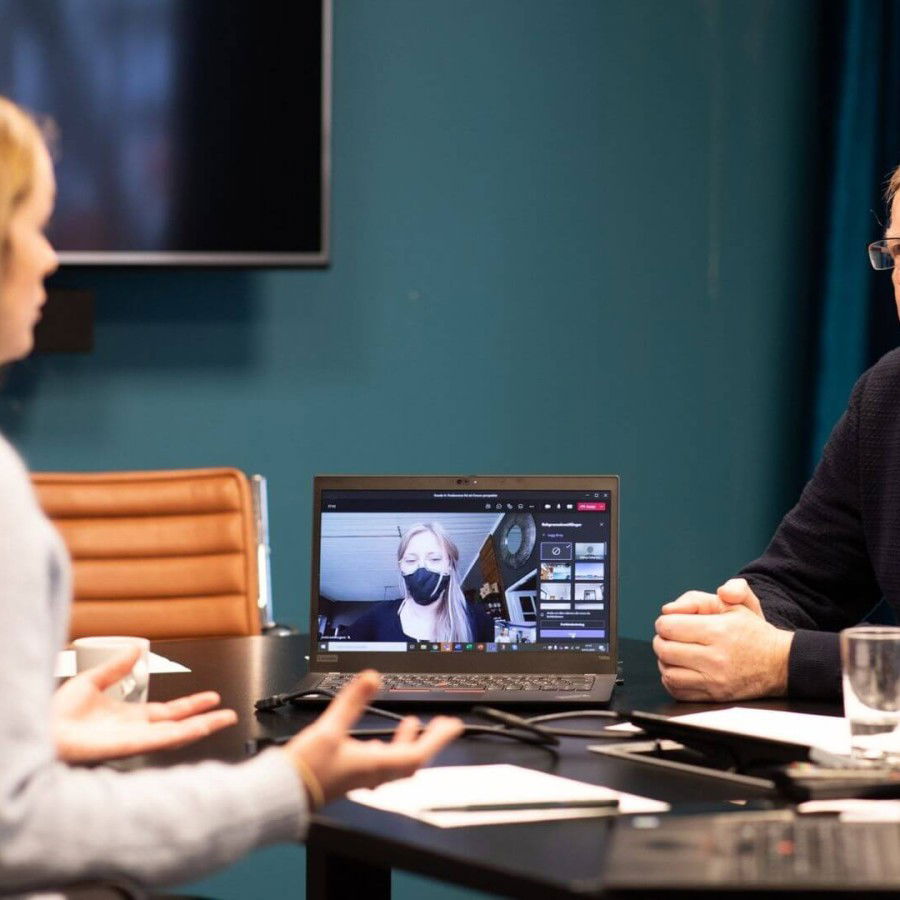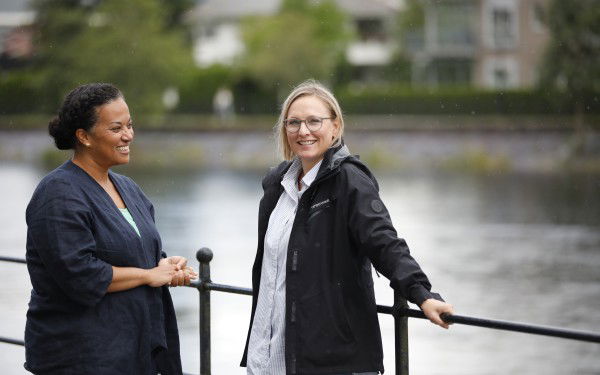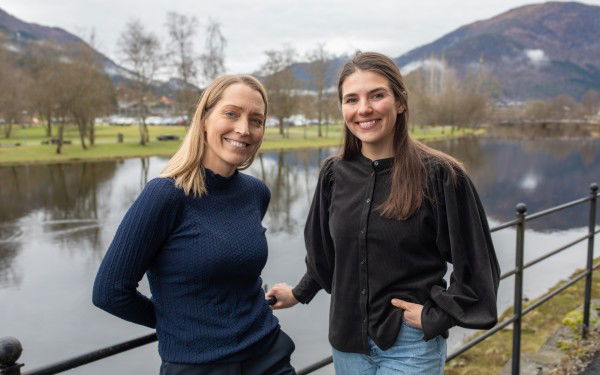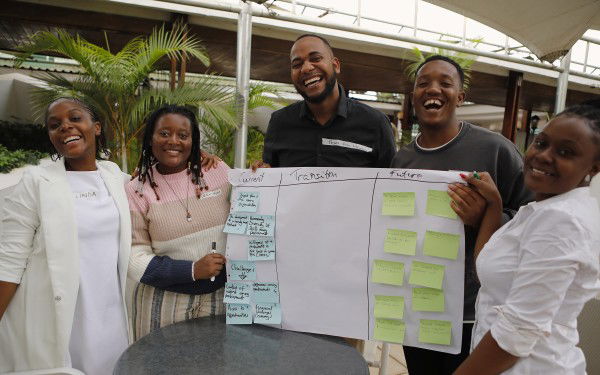Norec’s international collaboration grew stronger due to the pandemic
13. June 2022
The partners talked together more frequently and shared more information digitally during the pandemic. This has been demonstrated in a new report. Nonetheless, meeting face to face is still best.
“Cultural differences and hierarchy are less visible in virtual meeting rooms. A new feeling of fellowship emerges digitally, and the collaboration between organisations grows stronger,” explains Kari Lindemann, senior consultant with Norec.
She is responsible for the report entitled Hel eller halv digitalisering: Hva fikk vi til da verden var i lockdown (Full or semi digitalisation – What did we achieve while the world was in lockdown. Norec, 2021). The report is a review of what Norec and their grant recipients have gained in the way of digital knowledge since all exchanges were put on hold due to COVID-19 in 2020.
The report shows that it is not just the partners who have benefited from frequent digital meetings and knowledge exchange. Several partners have organised it so that employees from partner organisations in other countries can provide input and take part.
“Many partners have also found that more people in their organisations have become involved in projects, and that more feel a sense of ownership,” explains Kari Lindemann.
No replacement for meeting face to face
Although digitalisation has had many positive spin-off effects, both Norec and the partners are very clear that virtual meetings will never replace meeting people face to face.
“You cannot gain an understanding of new cultures or have work experience abroad if you only have digital meetings, and these remain key elements for an exchange,” says Director of Programmes, Marit Bakken.
The report also demonstrates that those parties who had the best results digitally were those who already had good relationships after years of working together face to face.
“So, we are now aiming to achieve the best of both worlds. When we are finally able to meet face to face gain, we will really benefit from everything we have achieved digitally. And now we can combine lots of different methods, which will be great,” Marit Bakken concludes.
Resulted in change for Norec
Norec has started exchanges again in the winter of 2021/2022. Gradually, partners are starting to send employees or volunteers on exchange between several countries. Moving ahead, Norec plans to combine the best lessons they have learned during the pandemic with 20 years of experience of physical exchanges. Norec calls this their “hybrid model”.
Some of the methods implemented by Norec during the pandemic will continue:
· More flexibility for the participants to work in their organisation both before and after an exchange.
· More digital meetings between Norec and the partners and between partners. Closer follow-up by combining digital and physical meetings.
· Keep organising webinars for persons involved in projects during the project cycle. This provides both professional input and valuable networking for more people.
Best practice from the partners during the pandemic
WAVE (India)
The agricultural organisation, Wave, in India noticed that the transition to online activities was a culture shock for many small-scale farmers. To make this transition easier the organisation provided follow-up for online activities with meetings in the local communities. They used WhatsApp and Messenger to provide simple and quick communications. The younger members of Wave played an essential role in teaching the older members how to use smartphones and WhatsApp. There has been an improvement in digital expertise, and an increasing number of members have become digitally literate.
Wave has also developed an app for farmers. The app provides information on inventory management, starting production, registration of sales and recipients. The farmers can use the app to send any questions they have about problems with farming and receive guidance from an expert. They can send questions either as a written message or a recorded message. The app also shows the farmers’ geographic location, so that the advice given can be customised to the local climate.
Wave is now planning to transfer this knowledge to the South African organisation, Climate Specific Agro Advisory, providing the same opportunities for small-scale farmers in South Africa.
The Leprosy Mission Nepal
The Leprosy Mission Nepal started providing digital follow-up of patients with leprosy in 2020. The consultations have been held both online and over the telephone. Expertise developed in Myanmar is now used to benefit patients in Nepal, and a manual has been prepared describing how consultations can be provided remotely and digitally.
The Norwegian Band Federation (Norges Musikkorps Forbund) and Field Band Foundation in South Africa
In order to achieve the results expected for these partners, both organisations have had people working together in digital work groups. They have created a digital library of activities with short films demonstrating working methods. This has developed into a resource-bank available to music teachers in both Norway and South Africa, and a source of inspiration and ideas for new and exciting ways to get children and young people involved in relevant social issues. One main theme in the YouTube collection is how music can help improve mental health and boost self-esteem.
Y Global
Y Global has an exchange project for young activists in Kenya, Sudan, Uganda and Norway. They work on sexual and reproductive rights.
The young people involved in Y Global’s exchange project explain that online consultations and digital meetings have helped many feel freer to ask questions or express their sexual tendencies. Many of them have experienced prejudice due to their sexual orientation when meeting others face to face, while the online spaces have provided the young people with safe arenas where they can be themselves.
Some also felt that it was easier to express themselves in writing, and the participants claimed that the chat functions have resulted in an increased sense of achievement and participation in open meetings. Others explain how the threat of physical violence is eliminated when meetings on the subject of gender identity and sexual orientation are organised anonymously and digitally.
Nonetheless, the process involved in organising virtual health clinics for young people has been challenging. Developing trust relies 100% on meeting people face to face. Digital consultations have worked well for a period of time, but require extra capacity and do not generate the same level of closeness and warmth as non-digital meetings.
An external evaluation of the project showed that digital communication is most successful when involving messages regarding human rights, major campaigns and social media, crowdfunding and online learning.
WAGGGS
The World Association of Girl Guides and Girl Scouts (WAGGGS) has found that they can make better use of the exchange participants than before, and that the costs are less. Normally, the organisation sends 45 participants on exchange every year. In 2021, there were no exchanges, but WAGGGS was still able to keep 288 girl guides and girl scouts very busy. They all worked in their home countries, where they are familiar with the cultural context. They designed and carried out information campaigns and educational campaigns on subjects involving e.g., menstruation and COVID-19, and helped a number of young women learn more about health.
WAGGGS has also developed digital courses, blogs and resource gatherings for partners. In addition, they have developed a digital platform called the digital camp-fire. This is where the guides can meet other volunteers, share experience and discuss challenges. When campaign work in each individual country is combined with these kinds of digital spaces, the organisations in each country can continue to learn from each other. A similar system can also be positive for other global membership organisations.
As such, campaign work in each individual country can be combined with digital spaces, so the organisations in each country can continue to learn from each other.
The work on campaigns in each country can be combined with digital spaces where the guides and girls scouts can meet other volunteers from their exchanges to share experience and discuss challenges.
Resource gatherings for the partners, allowing the members to meet in informal digital spaces known as the digital camp-fire. When campaign work in each country can be combined with digital spaces where the girl guides and girls scouts can meet other volunteers from their exchange to share experience and discuss challenges, the organisations in the different countries can continue to learn from each other. This will also be beneficial for other global membership organisations and partnerships that have a high number of volunteers.
Haukeland
Haukeland University Hospital is working on a project involving the use of video when training surgeons. The purpose is to allow for communication during surgery. The video transmissions will also make up part of preparations prior to an exchange. This implies that the participants can make use of the preparatory period for learning, so they are more ready to take on tasks when the exchange starts.




